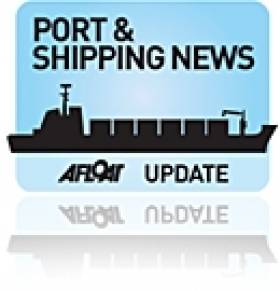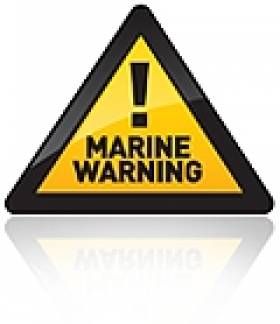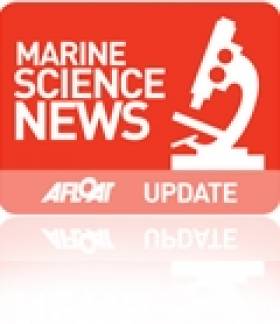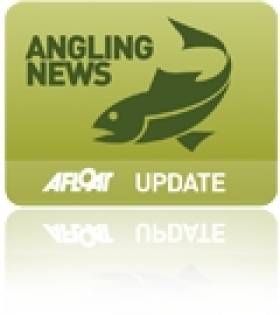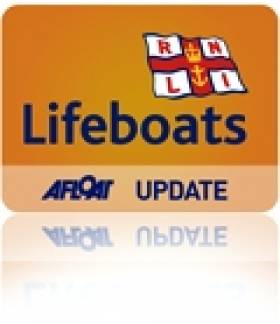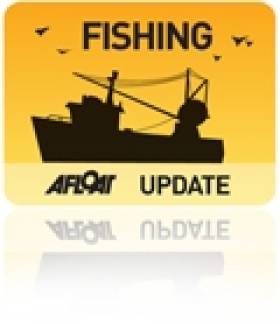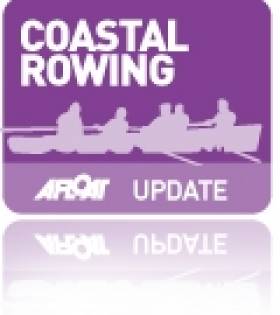Displaying items by tag: Galway Bay
New Passenger-Only Ferry for Northern Ireland-Scotland Route
Plans to operate the first passenger-only ferry service between Northern Ireland and Scotland are scheduled to start in late May, writes Jehan Ashmore.
Kintyre Express is to operate a Ballycastle-Campbeltown service on Fridays, Saturdays and Sundays between 27 May and 26 September. Three daily return trips are scheduled on the service though the 1200hrs sailing from Campeltown and the corresponding 1400hrs sailing from Ballycastle will only operate on customer demand.
The passage time is scheduled to take approximately 1 hour 30 minutes between County Antrim and the Mull of Kintyre which is a distance of some 50 kilometres / 30-miles. Ticket fares for a single journey are £30 and the return is £55. On the remaining days that the route is not operated on, the boat is available for private charter.
In addition the new venture is to include an on-demand Campbeltown-Troon route running between April and September. This second service, linking Argyll with Ayrshire, will operate on Sundays, Wednesdays and Fridays. The journey time is somewhat shorter with a scheduled time of 1 hour 15 minutes. The on-demand service must be booked in advance with singles fares costing £50 and a return ticket at £80. For further information click www.kintyreexpress.com
Like the recent proposals announced for a passenger-only ferry service across Galway Bay click here, the Kintyre Express operation will also use a fast-ferry in the form of rigid inflatable boats (RIB). The two routes from Campeltown will be served by Redbay Stormforce 11 metre RIBS which have centrally heated fully enclosed cabins for about 10 passengers. The Redbay Boats are built in Cushendall, Co. Antrim, for further information about the type of RIB to be used on the new routes click here.
The Ballycastle-Campbeltown route will be unique in that it will be the sole passenger-only ferry operator serving between the island of Ireland and the UK.
When the second route opens between Campbeltown-Troon, the company will be able to provide their boat service linked in with a train journey to Glasgow which they claim can be completed in less than two hours. Trains between Troon and Glasgow Central Station operate every 30 minutes and with a journey time of approximately 40 minutes.
For those who are car-free and time-free, this most northerly of travel routes is arguably the most scenic way to travel between Northern Ireland and Scotland and will appeal also to the intrepid traveler.
On both ferry services bicycles are carried for free and currently there is a special offer with all ferry tickets that can also be used for a free-day pass on the local Kintyre bus network for up to 24-hours. The bus operator is Craig of Campbeltown which trades as West Coast Motors and which owns Kintyre Express. The bus operator also serves on routes throughout Argyll and the island of Bute.
The next nearest cross-channel operator to the Kintyre Express Ballycastle-Campbeltown service is the car-carrying catamaran fast-ferry seasonal service between Larne and Troon operated by P&O (Irish Sea). The same company operates the year-round conventional car-ferry service on the North Channel between Larne and Cairnryan. Also operating to Loch Ryan is Stena Line which operates both ferry and HSS fast-craft services on the Belfast-Stranraer route.
Over the years there have been several attempts to revive the ferry between Ballycastle and Campeltown following a service that catered for vehicles too. For three summer seasons starting in 1997 the service was operated by the Argyll and Antrim Steam Packet Company, using the Claymore (1978/1,632grt) which could accommodate 500 passengers and 50 vehicles.
In 1996 the vessel was chartered to carry out tender duties for visitors and crew of the aircraft-carrier USS John F. Kennedy (displacement 82,655 tons full load) which was at anchor off Dun Laoghaire Harbour.
Coastal Areas Braced for Flood Risk Tonight
A combination of high tides, high winds and low pressure increase the possibility of coastal flooding, particularly at high tide around midnight on Sunday 7 November and midday on Monday 8 November.
A deep low pressure centre is expected to move down across Ireland tonight, clearing away slowly during Monday. This weather system has the potential to bring some severe weather to Ireland. Rainfall totals are likely to reach 25mm - 30mm in places during Sunday and Monday. While not excessive, this rain may lead to some localised flooding on roads. The strongest winds associated with this weather system are likely to be well to the west of Ireland; however if the track of the low pressure is further east than currently expected, then these very strong winds may possibly affect our west coast.
The principal dangers from this weather system will be due to very high seas off the southwest and west coast (waves approaching 9m) and coastal flooding due to a combination of high tides, very low pressure, storm surge and onshore winds. The danger period extends through Sunday night and, for the east coast, much of Monday also. Valid from: 12hrs Sunday Nov 7th To: 06hrs Tuesday Nov 9th.
Householders, property owners, motorists and pedestrians are warned that there is a risk of coastal flooding in Dublin in the next 36 hours according to a Dublin city council update issued last night.
More from Cork City Council HERE
More from Dublin City Council HERE
Explorers Team Goes Out of the Deep and into Space for Science Week
The Explorers Education Programme run by Galway Atlantaquaria with the support of the Marine Institute is emerging out of the deep blue sea and into space to celebrate the launch of National Science Week 2010. 'Our Place in Space' is the theme for this years Science Week event and the aquarium have organised a Family Fun Day on Sunday 7th November from 12.00 noon. We're offering a special price on the day of €12.00 for one adult and one child to include all activities.
This annual event at the aquarium will include interactive displays and talks from the Galway Astronomy Club and the Dept. of Physics & Astronomy at NUI Galway, Space Invaders and Pac Man games, Face Painting, Cartoon Art lessons for Aliens by the Marine Institute and a display of Ireland's very own Alien Species! A host of fun activities for all the family with Galaxy Art & Crafts and Amazing Space Science Experiments is organised. The event will be opened by Mayor of Galway, Cllr. Michael Crowe.
In a run up to the event, Galway Atlantaquaria is calling on primary school children to create an Alien Sea creature to celebrate Science Week 2010. Children are invited to use their own imagination to create their Alien Sea Creature works of art using discarded or reused materials. Age category prizes on offer and all entries will go on display at the aquarium. Remember all finished art work must be at the aquarium by Thursday 4th November and don't forget to include your name, age and school to your entry.
Science Week 2010 aims to raise awareness of the space industry in Ireland, with a wide range of activities taking place which will look at the latest happenings in astronomy and space exploration. For more information see details on the Galway Atlantaquarias website or contact 091 585100 or email [email protected]
Fly tying to be Centrepiece of New Angling Exhibition
Most of the top names in fly tying and angling will be in Galway this November for the inaugural Irish Fly Fair say Galway organisers. Well known game angler Stevie Munn will be in town in partnership with Irish Angler magazine. The event sponsored by Inland Fisheries Ireland has succeeded in attracting many of the world's best fly tyers and anglers – including the top Irish ones – to what promises to be a great weekend for anglers and their families.
Centerpiece of the event will be the fly tying area, where over 30 world class experts will give demonstrations of their art and skill, as well as lessons in the techniques of constructing Salmon, Trout, Pike and Saltwater flies.
In addition there will be casting demonstrations by World renowned Fly Casters and also instruction from fully qualified instructors.
For those looking for Christmas gifts, there will be a wide range of tackle and other retailers with lots of bargains on offer.
There will be lots for the family too. For the first time ever in Ireland French firm Scatri will be letting people practice their angling skills on their range of fishing simulators. Galway Aquarium will allow visitors to see the wide range of fish and other creatures that live in our waters up close and personal and also an expert on entomology will be there. Galway Bay FM will broadcast live from the event on Saturday. Chef Chris Sanford will prepare a number of haddock recipes throughout the weekend, to complement Bord Bia's current promotional campaign to increase the awareness, and Irish consumer's consumption, of haddock.
More information HERE
New Pay to Race series to Stop in Cork, Galway and Derry
A new pay to race series around our shores with stop offs in Cork, Galway, Derry has been confirmed. The Round Britain and Ireland Challenge gets underway next year and no experience is needed pre race by the crews as a large amount of training is offered; the crews usually include a mixture of ability and experience and all the yachts are skippered by a Royal Yachting Association Yachtmaster qualified individuals.
With stop offs in a variety of ports this event should offer something for everyone interested in seeing Britain and Ireland from a new perspective whilst racing in a fleet of fantastic yachts.
The races which will start from spring 2011 are using a fleet of six bespoke brand new Dehler Varianta 44’s which are in build in Griefswald at the Hanse/Dehler yard right now. The training weekends and each race start and end in Weymouth bay, the home of the sailing events of the 2012 Olympics, with stop offs from Cork, Galway, Londonderry, Inverkip, Stornoway, Leith, Hull, London, and Cowes.
The series offers sailors of all experience levels the chance to either undertake a single leg from £600, or the whole 28 day race from £4,750 per person. Included in this price are two training weekends with around 300 sea miles, sea survival training, all port fees and food whilst at sea, Gill OS2 offshore foul weather gear, and a post race awards dinner. For more information please contact the race organisers at [email protected], or call 01305 775935 / 08456 434603.
Galway Lifeboat Rescues Person Stranded near Hare Island
A member of the public rang the Irish Coastguard to report a person surrounded by water halfway across the causeway at approximately 3.10pm.
The Coastguard tasked Galway RNLI lifeboat, which launched within four minutes from Galway Docks. The lifeboat carried out a search of the area but did not find anyone in the water. The crew were informed a short time later that the person had made it safely ashore and did not require medical attention.
Galway's Lifeboat Operations Manager, Mike Swan, urges people to be careful when walking on or along the shore, as the tide can come in very fast:
"People may be aware of the tides but they are still getting caught out, particularly in Renmore at Ballyloughane Beach".
The volunteer lifeboat crew on this call-out were: Helmsman John Byrne, Martin Oliver and Keith Faller.
Related Safety posts
RNLI Lifeboats in Ireland
Safety News
Rescue News from RNLI Lifeboats in Ireland
Coast Guard News from Ireland
Water Safety News from Ireland
Marine Casualty Investigation Board News
Marine Warnings
Unique Fisheries Conference Set for Galway
A unique conference - aimed at making the most of fisheries information collected from commercial fishing vessels and fishermen themselves – will take place later this month in Galway between the 23rd and 26th August.
The conference will be hosted by the Marine Institute and is being convened by Norman Graham (Marine Institute, Ireland), Richard Grainger (Fisheries and Agriculture Organisation - FAO), William Karp (Alaskan Fisheries Center – NOAA, USA) and Kjell Nedreass (Institute of Marine Research, Norway).
It will also feature a number of well known speakers from the fishing industry including Lorcan O'Cinneide of the Irish Fish Producers Organisation, Gavin Power of the Irish South and West Fish Producers Organisation, and Barry Dees from the National Federation of Fishermen's Organisations, UK.
The theme of the conference will be to find ways of harnessing the information from commercial fisheries and observations made by fishermen so as to improve scientific advice and management of marine resources, As Norman Graham observes, "every time a fisherman puts his net in the water, he's not only catching fish, he's taking a scientific sample as well."
Galway's Atlantic Oarsman in World Record
At the beginning of August, a 23ft four-man rowing boat arrived off The Lizard, England's most southerly headland and the traditional point for Transatlantic bids, to establish a new transoceanic rowing time for the crew of one Irishman, two Scotsmen, and a Faroes islander. Lorna Siggins of The Irish Times set the scene as they made their first landfall approaching the Isles of Scilly fifty miles westward. Click HERE.
Click this link for Irish Rowing detailsClick this link for the Latest Rowing News
Galway Bay Sailing Club
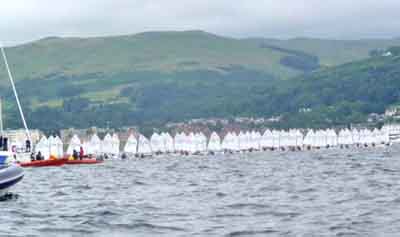 Left: Irish U–12 Squad at UK Optimist Nationals
Left: Irish U–12 Squad at UK Optimist Nationals
Galway Bay Sailing Club is based in Renville Oranmore, approximately 7 miles from Galway City. The club is renowned for the warm welcome it extends to its members and visitors alike. It organises and facilitates the racing and sailing of dinghies, cruisers and multihulls for adults and junior members. The club also offers training and instruction to adults, juniors and non-members.
The clubhouse with bar and catering facilities opens on Sundays afternoons and also Tuesday and Wednesday nights from April to September to facilitate the various racing fleets During the remaining months it opens on Sundays for dinghy racing and on Wednesday nights for talks and social events. The club has played host to many successful Regional and National Regattas with racing taking place against the backdrop of beautiful Galway Bay.
Galway Bay Sailing Club (GBSC), Rinville, Oranmore, Co. Galway
(Details and image courtesy of Galway Bay Sailing Club)
Have we got your club details? Click here to get involved



























